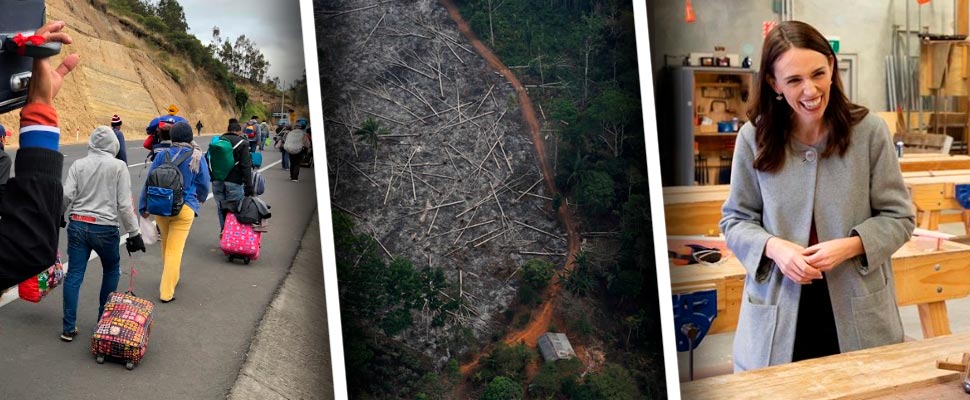5 international news of the week
These are the main news of this week

We present you the most relevant international news this week. / Photos: Reuters, instagram.com/jacindaardern
LatinAmerican Post | Juliana Suárez
Listen to this article
Leer en español: 5 international news of the week
1. The pandemic worsens
"The situation is getting worse," said Dr. Tredos Adhanom, director of the World Health Organization, last Monday after registering 136,000 infections in one day. According to the declarations, what is worrying about that number is that it is part of a trend that is increasing, because of the last 10 days, 9 have had more than 100,000 infections. He also assured that attention is now focused on Latin America, where several countries have already exceeded 100,000 cases.
With almost 7M #COVID19 cases & 400K deaths globally, this is not the time for any country to take its foot off the pedal. We urge active:
-surveillance to ensure the virus does not rebound
-finding, isolating, testing & caring for every case
-tracing & quarantining every contact https://t.co/B7po1dAN3F— Tedros Adhanom Ghebreyesus (@DrTedros) June 8, 2020
Dr. Tredos called on all countries not to lower their guard and reiterated that the numbers are already high and continue to rise, reaching 400,000 dead and 7 million infected. For this reason, he asked the countries that have already exceeded their peak to continue their efforts to avoid outbreaks. He recalled that although the first crisis has already been overcome in these countries, "the majority of people worldwide are still susceptible to infection."
2. After Floyd's death …
The assassination of George Floyd in the United States has triggered all kinds of civil action: peaceful and violent protests, vigils, and mourning ceremonies worldwide. People of color demand, among other things, that there be fairer treatment by the police force towards them, as they have been abused for their skin colors for years.
The first approach to this change began with the dismantling of the Minneapolis police department and the construction of a new model of public safety. This announcement comes as a beacon of hope for the thousands of protesters calling for police department budgets to be cut and to redirect the money spent to social and civil rights causes. Although this has not been confirmed, the news given by the City Council opens the doors to a root reform.
Thank you to the thousands of community members who have raised your voices to demand change. Thank you to @reclaimtheblock & @BlackVisionsMN for inviting us in. Today is a beginning. Minneapolis: we invite you to be part of building a system so our whole community is safe. https://t.co/fMaCw8HfyH
— Lisa Bender (@lisabendermpls) June 7, 2020
Meanwhile, Floyd's death has also reached Congress. The Democratic Party presented an ambitious bill that seeks to reform the police force. This law, called the Law on Justice in Police Tactics, seeks to regulate more strictly the scope of the police in the use of force. In this way, it would be explicitly prohibited to carry out actions such as the one that the police did against Floyd, putting his knee in his throat until he died. With the law, it is sought that these types of actions, if they happen, are easier to judge since there are now many gaps in the regulations that allow these cases to go unpunished. It is not yet known if this project will have a prosperous future given that the majority in the Senate is Republican.
Also read The charges in the George Floyd case and other news
Despite this apparent approach to justice, one of the police officers involved in Floyd's death, Thomas Lane, who was accused of complicity, was released on bail. The policeman paid $ 750,000 and he was released from prison last Wednesday, after 7 days of being inside.
3. Deforestation in the Amazon
The Foundation for the Conservation and Sustainable Development in the Amazon (FCDS) published a report on deforestation in the Colombian Amazon during the first months of 2020. According to the foundation, “more than 58 thousand events of heat sources were reported. The FCDS monitoring registers more than 75 thousand devastated hectares. In April and May the pandemic has not stopped the devastation. "
One of the reasons the figure is so high, according to the FCDS, was that the heavy period of deforestation, which is usually in the last months of the year, was postponed because the heavy rains that normally arrive in January appeared early. Thus, much of the deforestation postponed in 2019 was carried out in the first months of 2020. The report urges the alarm to be raised in areas with low governance, since this is where, due to the presence of armed actors and the lack of environmental programs, they tend to become areas of deforestation.
4. New Zealand, back to normal
At the same time that the WHO alerts on the complication of the pandemic, New Zealand declares that it will return to normal after having had 17 days without infections and after discharging its last active patient. With these data, the government decided to go to phase one, which means the complete economic reopening of the country, after they had been gradually opening up. Now the only restriction will be some tighter border controls than normal.
Prime Minister Jacinda Ardern was praised worldwide for her handling of the pandemic from the start, whose approach was one of totally restrictive confinement for nearly two months. It began its gradual reopening in May, and with its last patient discharged, New Zealand confirmed a total of 1,154 infections and 22 deaths.
5. Venezuelan exodus
Millions of Venezuelans have experienced the pandemic in a particularly tragic way. Many had had to flee to neighboring countries in the region, especially Colombia, and lived on informal work, which has been affected by confinement. Today, many of those Venezuelans have had to undertake their journey back to Venezuela and they assure that they prefer to die in their country than in someone else's.
According to official figures collected by the BBC, since the quarantine began, 74,000 Venezuelans from Colombia have entered. This has led the Venezuelan government to limit the number of people who enter the country daily, leaving hundreds of people on the border without protection, food or shelter and exposed to the coronavirus.
As a consequence, Cúcuta, a Colombian city that borders Venezuela, has thousands of Venezuelans starving and sleeping on its streets. Despite donations from the international community to help Venezuelan migrants during the contingency, many find themselves without any recourse waiting to gain access to their country.
¿Se acuerdan de los países europeos que hace unas semanas donaron dinero para atender a los “pobres migrantes venezolanos”?
Miren cómo viven en campamentos improvisados en Bogotá los venezolanos que quieren regresar a su país
¿Y ACNUR? ¿y las donaciones? pic.twitter.com/dpoinRcPwX
— bruno sgarzini (@brunosgarzini) June 12, 2020
Meanwhile, Venezuela's Foreign Minister Jorge Arreaza has assured that 8 out of 10 cases of COVID-19 in the country come from Venezuelans arriving from Colombia, Ecuador and Peru, which is why they have limited entry.




